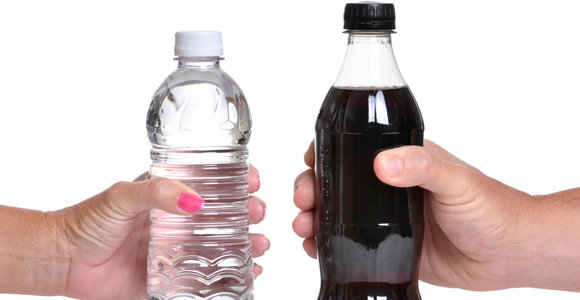A study from the journal Obesity claims that drinking non-nutritive sweetener drinks (like diet soda) instead of water aids in weight loss. But diet soda is quite controversial in the media and has repeatedly been linked with weight gain and increased risk of metabolic syndrome. So, should we drink it or not?
The Study
The first thing to note is that the study was funded by the American Beverage Association. That doesn't necessarily mean a biased result, but it does mean that we should read the study closely. The participants were divided into two groups: one group that drank diet drinks, while the other drank only water, without any limits on the volume able to be consumed. All participants were categorized as clinically obese prior to the study and drank at least three non-nutritive sweetener (diet) drinks per week.
After 12 weeks, the participants who drank diet beverages lost an average of 13 pounds, while the group who could only have water lost an average of 9 pounds. Those that drank diet beverages had better improvements in total cholesterol and in LDL (bad) cholesterol. They also lowered their triglyceride levels. Participants in both groups lowered their blood pressure and waist circumference.
But Is This Study Accurate?
It's important to note that the link does not necessarily equal cause--the fact that the diet drink group lowered their cholesterol and triglyceride levels could be attributed to the simple fact that they lost more weight. Further, sustaining a reduced-calorie diet takes dedication and willpower. Trying to simultaneously give up something that you drink regularly (in this case, diet soda) could make it harder for the water group to maintain their diet.
The basic result, really, makes sense. By replacing high-calorie drinks with low- or non-calorie diet drinks, you should lose weight due to the calorie deficit. Diet sodas are popular because they promise the sweet taste of a regular soda without any of the detrimental effects of consuming a high-calorie, high-sugar drink. But do we really believe we can receive something in return for nothing?
The Effects of Drinking Diet Soda
A Harvard Medical School study of more than 3,000 women found that drinking diet soda is associated with an increased risk of kidney decline. Interestingly, the link was not found with regular sodas, which means that the diet sweeteners could be a contributing factor.
You might think that by avoiding the sugar in a normal soda, diabetes wouldn't be an issue, but a study published in 2013 in the American Journal of Clinical Nutrition showed that people consuming both regular and diet soda raised the risk of diabetes. Women who drank one 12-ounce diet soda per day had a 33 per cent increase in risk of developing Type-2 diabetes. Additionally, soda drinkers also have compromised dental health as soda is very acidic and wears away the enamel on teeth.
The artificial sweeteners used in diet drinks are controversial and have been attacked in recent years for potentially contributing to cancers and depression. While the FDA has approved their use, the long-term effects of these sweeteners are not yet known.
So, What's the Bottom Line?
It's interesting to note the study's official conclusion that, "these results show that water is not superior to (non-nutritive sweetened) beverages for weight loss during a comprehensive behavioural weight loss program." The researchers are not specifically recommending the consumption of diet drinks for the general population, but that the typical recommendation of only drinking water while dieting may not produce the best results.
Taking into account all of this information, it's possible that diet soda may aide in weight loss for those people who consume a high amount of regular soda. However, it should be used as a stepping stone from regular soda to more beneficial drinks like water or tea as diet soda has been shown to have harmful effects. For the general population, avoid diet sodas and instead opt for tea or flavored water.
Carolyn McAnlis, RDN, is a Registered Dietitian Nutritionist who has a special interest in preventing chronic disease through nutrition. She graduated from Syracuse University with a Bachelor of Science in Nutrition Science & Dietetics and a minor in Psychology. After completing a full-time dietetic internship at the University of Virginia Health System, she has developed a passion for convincing others that healthy food can be delicious through her blog A Dietitian in the Kitchen.



